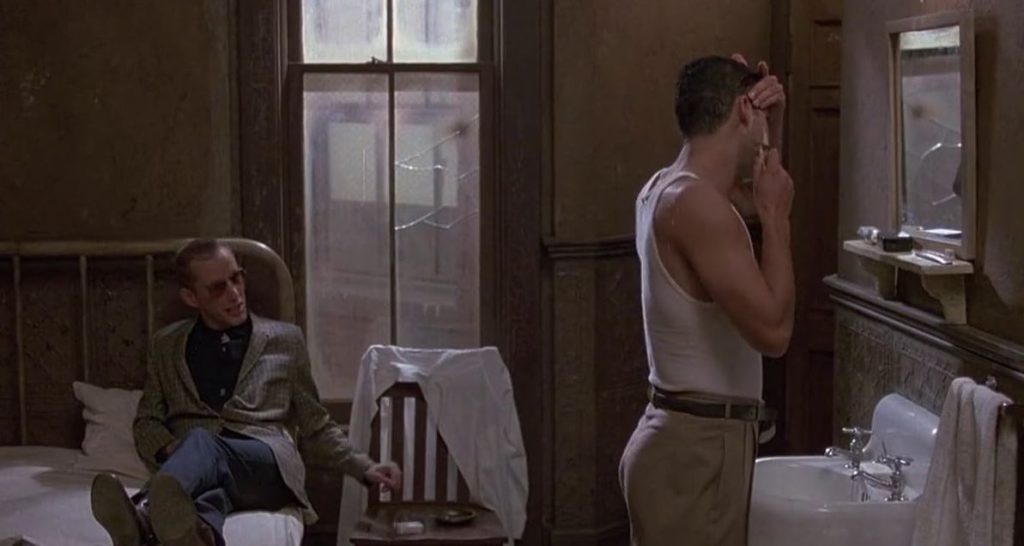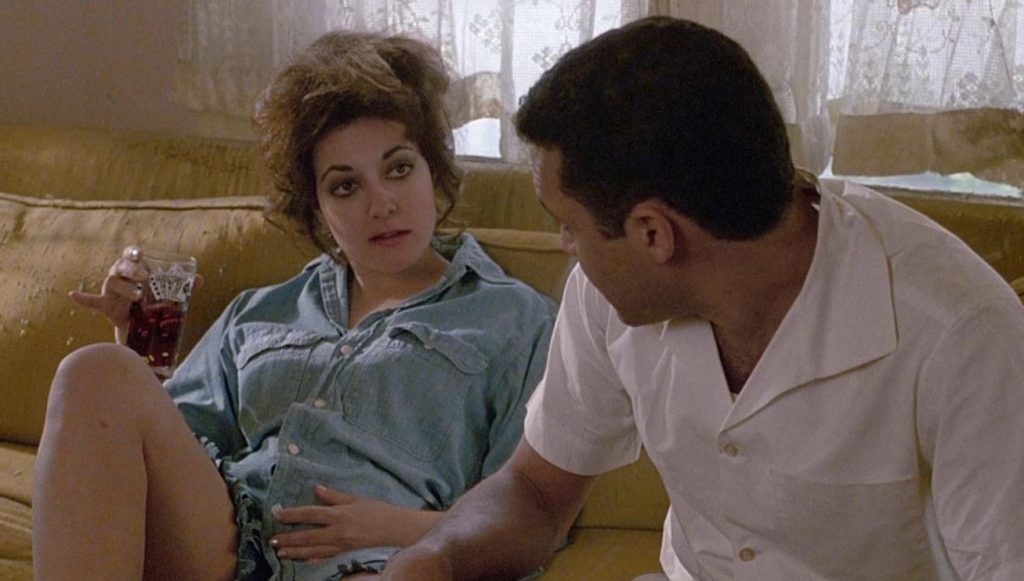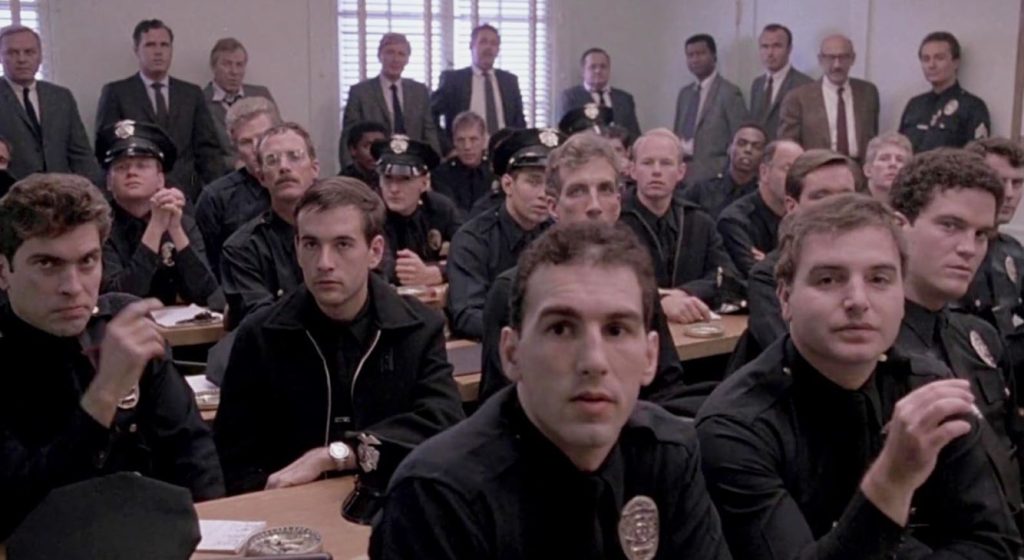There is a certain sensibility to many 1970s Hollywood dramas, a style that has been imitated but rarely truly achieved in any subsequent era, a nihilistic feeling of doom and hopelessness that pervades at least until the sunshine beam of hope cracks through the darkness in the final scene (or not). It’s a blessing that the then popular trend of ending on a freeze frame (The Deer Hunter, Capricorn One, to name just a couple) died along with the decade, but in every other way, even the relatively forgotten ones still pack a hell of a punch nearly 50 years later. Harold Becker’s adaptation of Joseph Wambaugh’s true crime novel The Onion Field is a great example of a regrettably forgotten 70s masterpiece.
Becker leads us into this very dark story gently enough, panning across an idyllic suburban neighborhood before landing on a lone man working as a gardener at one of the houses along the block. He sees a newspaper headline, only partially visible on one side of the fold, indicating that the “Onion Field Killers” have gotten life in prison. THIS IS A TRUE STORY, we are assured before we flashback to March 1963 and join our gardener, Karl Hettinger (John Savage), when he was a young police officer just meeting his new partner in the Felony Department, Ian Campbell (Ted Danson in his feature film debut).
As these two get to know each other, we see the parallel meeting of the two other key players, Jimmy “Youngblood” Smith (Franklyn Seales) and Greg Powell (James Woods). From the moment he appears onscreen, the silver-toothed hustler Powell is manipulating Jimmy, giving the newly freed convict money and promising him criminal opportunities to come. It’s clear he is a veteran con artist and even from the beginning Woods imbues the character with a sense of impending danger as well, the sense that he will strike like an angry rat if cornered. Seales is no less adept at conveying Jimmy’s personality right from the start, the resentment and mistrust this oft-jailed thief feels toward anyone and everyone as he matches Powell’s fake smile and enthusiasm until the “cornpone jive-ass peckerwood” is out of earshot.

Hettinger, meanwhile, dreams of owning a farm and living the simple life. “Police work is so noisy,” he says. “Tomatoes are so… quiet.” There is an underlying theme of traditional masculinity in crisis throughout The Onion Field, and Hettinger bears the brunt of it as a fellow who was perhaps always “too sensitive” for police work. Long before the murder of his partner and his subsequent struggles with survivor’s guilt, the sense that he failed to do his duty, and all the subsequent emasculation Hettinger endures later, there is the scene at the police station in which a fellow who has been busted for soliciting a trans sex worker flies into “homosexual panic” and has to be restrained. “Boy finally realized who he is,” Campbell explains, “and he’s scared and confused.”
The theme of masculinity takes on a competitive, sort of sexual tone in the relationship between Powell and Jimmy, as the former displays the coiled snake hiding behind his mask of charisma when he threatens Billy (Lee Weaver), his drunken crime partner, with a gun for stealing some cash and patting his “little woman” on the ass. He doesn’t actually mind the latter offense, he says, pointedly looking at Jimmy when he explains they are “sort of a family.” Implicitly then, he is offering the services of his “little woman” (Beege Barkett) to the newly paroled Jimmy, who nevertheless is frantic to get rid of any lingering smell in the air when Powell comes back earlier than expected just after the sexual encounter does take place behind his back. This is one of a number of surprisingly funny scenes in an often pitch-black movie.
There’s a palpable fear wafting off of Jimmy in his every interaction with Powell. From the start he knows he shouldn’t trust this obvious psychopath who’s done time in the “nut jail,” but the desperation of his poverty and the promise of “some real money” keep him tethered to Powell, like a beaten dog unable to leave its abusive owner. He almost does make his escape one night as the noises of Powell and his little woman (the character is never named) come through the shared wall of Jimmy’s guest room. Powell cajoles him back in with a bit more competitive masculinity regarding the noises. “I’m a sexual virtuoso,” he says. “That means I’m an expert in pleasing women.”

Masculine competition figures heavily into the abduction and killing sequence, in which the coiled menace behind Powell’s eyes comes out in full force. After disarming (unmanning) Campbell and Hettinger, Powell and Jimmy force them to drive to the titular field, with the promise from Powell that they will be let go from there. Hettinger might be naive (or just optimistic) enough to believe they will survive the night, but Campbell seems to know the score, and Danson maintains a quiet dignity throughout this scene and right to the end of his role as the doomed Ian Campbell.
“You in the Army?” Powell asks him, grinning. “Marines,” Campbell calmly replies, not trying to take the bait of the military dick-measuring contest Powell wants to begin. When he finds out Campbell fought in Korea, Powell makes the dick-measuring almost literal by suggesting a shooting competition. Jimmy, perhaps also aware of how deadly the evening is about to become, laughs nervously and tries to diffuse the situation, metaphorically holding his boy back from the fight, telling Campbell, “You better not, my partner, he’s a crack shot.”
The killing in the onion field is Ruthless, expertly building dread until the abrupt, nearly mid-sentence gunshot Campbell takes to the upper lip, and suddenly high-pitched shrieks fill the soundtrack, soon revealed to be coming from Jimmy, who, even if he was uneasily aware of Powell’s intentions, was clearly not prepared for the reality, the finality of it. It’s unclear in the chaos of this shockingly brief moment, and Hettinger’s scrambling escape, who fired the additional four shots into Campbell as he lay on the ground, but this is one of the most memorable onscreen murders of all time, burning itself into the viewer’s brain like Joe Pesci’s horrid death in Casino.
When Powell is busted on a traffic stop, after he and Jimmy have split up, his first instinct is to go for the gun (what’s two more dead cops to a psychopath?), but when he fails to locate it under the car seat, he resorts to the oily charm. The second one of the cops’ back is turned, though, he’s eyeing the gun again, and once he’s locked up in the interrogation room, Sgt. Brooks (Ronny Cox) is barely in the door before Powell is eagerly trying to pin the whole thing on Jimmy, giving up his whereabouts and saying, “I wasn’t even armed at the time.” One has little doubt the emotionless creep could pass a lie detector to that effect, too.
Jimmy’s arrest has the gritty verisimilitude of other great 70s crime movies like Mean Streets and Dog Day Afternoon (“Move, cop-killer! MOVE!”), and in his interrogation we see the sad pattern of his life, being kicked around from one manipulator to another. In this case it’s Sgt. Brooks, who reassures him that his story checks out with Hettinger’s, giving him false hope before pulling out the rug by casting doubt on whether he fired some of the additional shots into Campbell. “Has your conscience ever bothered you?” Brooks asks Jimmy. “Like feeling guilty?” “I think that is something that rich white guys dreamed up,” Jimmy replies, “to keep guys like me down…. Guilty? That’s just something the Man says in court when your luck runs out.” How’s that for a Ruthless one-liner, folks?
Back on the force, Hettinger’s emasculation continues at the hands of his fellow officers. First he is tasked with telling every Roll Call for the first few days he’s back what happened that fateful night. As his commanding officer says, “Just what you did wrong and wish you hadn’t. It just might save one of these young guys’ lives.” No pressure, fuck-up. At a meeting about the issue, an old school masculine, cigar-chomping beat cop (Richard Herd) defends Campbell and Hettinger for doing what they had to do, admonishing the other cops for not having “two hairy balls left in this department,” but the Stupid Chief shuts this down, saying, “Anyone who gives his gun up to some punk is a coward.”
Hettinger has at least not been invited to this meeting in which he is called a coward, but he is forced to relive the traumatic moment of Campbell’s death over and over again in court, as well as his nightmares, and then at the actual scene of the crime for a reenactment. No surprise, then, that cracks begin to appear in his facade. He’s distracted to the point of near-miss auto accidents, experiencing neck pain and headaches along with the flashbacks, and soon he’s acting out, with a traditionally rather feminine crime, no less: compulsive shoplifting, beginning with a watch band from the mall where he has taken a security gig after leaving the police force. Humiliatingly, he is caught and forced to resign from this job as well.

“Maybe a doctor would help,” Hettinger’s wife, Helen (Diane Hull), suggests, obviously meaning a psychiatrist, a shrink, the kind of unmanly thing only a shrieking hysteric would need. Even more emasculating, he can’t afford it because he no longer has a job. “At least we don’t have to worry about more kids,” Hettinger says later as he gardens (woman’s work, while his wife goes out and earns money to support their family), “the way I’ve been performing in bed lately.”
Thoroughly depressed, impotent and emasculated, Hettinger is at the end of his rope, finally striking his newborn baby in anger one night when his wife is at work and the baby just won’t stop crying. As he might have known from raising a previous daughter, this actually has the opposite of the desired quieting effect. Next thing you know he’s got the old service revolver in his mouth, on the verge of suicide rather than living through one more minute of this domestic drudgery. At the last moment, his older child comes into the room and talks him down by simply pointing out that the baby is crying, reminding him of his responsibilities, unmanly as they are.
Powell, acting as his own attorney, and Jimmy are sent up, and almost immediately upon entering the cellblock they get into a vicious fight, and Jimmy has a rare moment of triumph (“I whupped him! Without a gun he’s a pussy!”), but even in this moment there is an undeniable desperation and underlying defeat in his face. Indeed, soon after some advice from a jailhouse lawyer (Christopher Lloyd, playing a quintessential 70s Christopher Lloyd character, like it could be Jim from Taxi prior to his employment at the cab company) on how to exploit the legal system to avoid the death penalty, Jimmy is tearfully begging to be Powell’s friend again, even denying the truth of his own memories.
“Do you finally understand that you shot that cop when he was down?” Powell coldly demands as Jimmy stands before him, naked and vulnerable in the prison shower. “No matter what your mind lets you remember?” “I must have did it if you say so,” Jimmy snivels. “I wanna be your friend. We was like family.” He then goes to his knees to blow Powell in the shower.
You know, like family.
The reunited duo do manage to commute their sentence to life in prison rather than death, and as we leave Powell he seems to be thriving, turning out a new young con (William Sanderson) with all his old seductive, oily charm and talk of “family.” The master manipulator hasn’t changed a bit. Jimmy may not have changed much, either, but he’s older, wiser, and resigned to his fate. His aged face is now free of the constant wounded, desperate look we’ve seen throughout the rest of the movie as he sighs, “My man, I was born for prison yard.” The camera follows his gaze to his future: an extremely aged con shuffling through the yard in the distance.
Hettinger gets the happiest ending a 70s crime drama can allow, the kind of small ray of sunshine in all the darkness that occasionally shone through in this most nihilistic and hopeless era of Hollywood cinema. He gets a proper job again, a manly one, supervising 30 other men for a landscaping company. As a bonus, the job is in Bakersfield, near the site of the onion field murder, allowing him to face his trauma with his masculinity restored and move on.
Leave a Reply